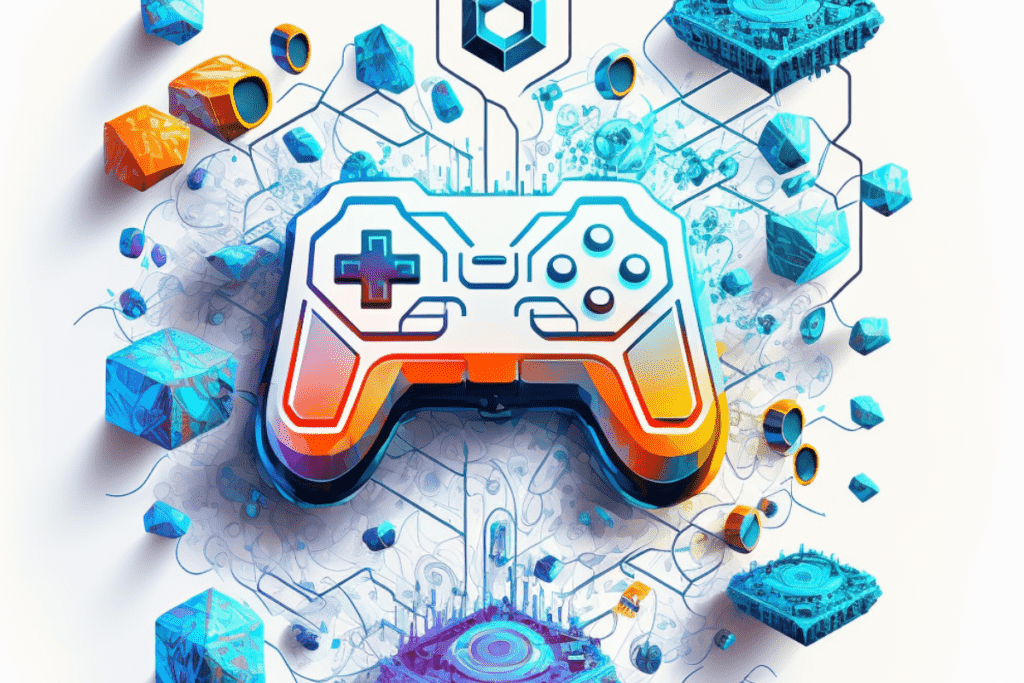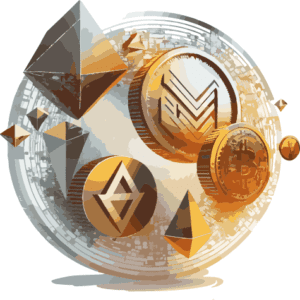Blockchain technology is transforming the gaming industry, providing new opportunities for digital entertainment.

With the advance of blockchain, virtual currency and ownership of virtual assets have become possible, changing how individuals interact and engage with games. The ability to truly own virtual assets and trade them on a global market is shaping the gaming industry’s future, thanks to blockchain.
In this article, we will delve into how blockchain is impacting the gaming industry and how it is shaping the future of digital entertainment.
Blockchain and Virtual Ownership
Virtual ownership in gaming refers to the ability of individuals to own and control virtual assets within a game.
These assets range from in-game items, such as weapons and armour, to virtual real estate and collectables.
In traditional gaming, game developers often control these assets and can be subject to limitations or restrictions on their use and transferability.
Blockchain technology allows for actual ownership of virtual assets by giving individuals control over their digital assets rather than relying on a central authority.
This is made possible through smart contracts, which allow for creating, transferring, and managing digital assets on a decentralised blockchain network.
This means that individuals can truly own their virtual assets and be free to trade them on a global market without the need for a central authority or intermediary.
There are many games currently using blockchain for virtual ownership. For example, the game Axie Infinity allows players to breed, raise, and battle fantasy creatures known as Axies.
These Axies are represented as non-fungible tokens (NFTs) on the Ethereum blockchain, allowing players to truly own and trade them.
Another example is the game Decentraland, a virtual reality platform that utilises blockchain technology to allow players to purchase and own virtual land, which can be used to create games and experiences.
These are just a few examples, but more and more games are starting to adopt blockchain technology to enable true virtual ownership for their players.
Blockchain and In-game Currency
In-game currency is the digital currency used within a game to purchase items, upgrade equipment, and access new features.
In traditional gaming, in-game currency is often controlled by game developers and is subject to its use and transferability limitations.
These limitations include currency expiration dates, restrictions on where it can be used, and the inability to transfer it to other players or games.
This can limit the value and utility of in-game currency for players.
Blockchain technology allows for actual ownership and trading of in-game currency by giving individuals control over their digital assets.
This is made possible through smart contracts, which allow for creating, transferring, and managing digital assets on a decentralised blockchain network.
This means that individuals can finally own their in-game currency and be free to trade it on a global market without needing a central authority or intermediary.
This opens up new possibilities for players, such as earning real-world money by trading their in-game currency and assets and using their in-game currency across multiple games and platforms.
A growing number of games are currently using blockchain for in-game currency.
For example, the game CryptoKitties allows players to purchase, breed, and trade virtual cats represented as NFTs on the Ethereum blockchain.
Another example is the game Gods Unchained, a collectable card game that utilises blockchain technology to allow players to trade their in-game cards.
These games are just a few examples, but more and more games are adopting blockchain technology to enable actual ownership and trading of in-game currency for their players.
Not only that, but the use of blockchain in in-game currency also gives players more control over their economy and game items, making it more fair and transparent.
It also allows for a more decentralised and open market, giving players more freedom and opportunities to trade their in-game assets.
This is why blockchain technology is becoming increasingly popular in the gaming industry and is set to change how we play and think about in-game currency.
Blockchain and Game Development
Game development is a complex and challenging process requiring much resources, time, and effort.
One of the biggest challenges facing game developers today is creating engaging and immersive gaming experiences while dealing with fraud, hacking, and data security issues.
Additionally, the centralised nature of traditional game development can lead to a lack of transparency and fairness for players and limitations on the use and transferability of in-game assets.
Blockchain technology has the potential to solve many of these challenges and improve game development.
Additionally, smart contracts can allow for creating, transferring, and managing in-game assets more efficiently and fairly.
This can make game development more efficient, cost-effective, and secure while making players’ gaming experiences more engaging and immersive.
A growing number of game developers are currently using blockchain technology to improve game development.
For example, Enjin has created a blockchain-based game development platform that allows developers to easily create and implement NFTs and virtual economies in their games.
Another example is the company ChainGuardian which is creating a blockchain-based game development platform for mobile and PC games.
These are just a few examples, but game developers are increasingly adopting blockchain technology to improve the game development process and create more engaging and immersive gaming experiences for players.
Moreover, blockchain technology enables developers to develop new games, such as decentralised games, virtual worlds, and NFT-based games.
This is why blockchain is becoming a key technology in the game development industry. It opens up new possibilities and opportunities for game developers to create innovative and exciting games.
The Future of Blockchain Gaming
The potential for blockchain gaming in the future is fascinating.
As technology continues to evolve and improve, we can expect to see more and more games utilising blockchain to provide players with actual ownership and control of their virtual assets.
This will lead to the creation of new types of games, such as decentralised games, virtual worlds, and NFT-based games.
Additionally, blockchain will enable players to earn real-world money by trading their in-game assets, blurring the lines between virtual and real-world economies.
The impact of blockchain on the gaming industry is set to be significant. It will change our thoughts about in-game currency and virtual assets, leading to a more fair, transparent, and open gaming experience.
The potential impact of blockchain on the broader entertainment industry is also significant.
As blockchain technology becomes more prevalent in gaming, it is likely that other areas of the entertainment industry, such as music, film, and television, will also adopt it.
This will give creators more control over their work and make it more easily accessible to audiences.
Additionally, it will open up new revenue streams for creators and give audiences more control over their entertainment experience.
It will enable audiences to interact more directly with their favourite creators and allow creators to interact more directly with their audience. This will lead to a more fair, transparent, and open entertainment industry.
Overall, the future of blockchain gaming is filled with possibilities and opportunities. It has the potential to revolutionise the way we play and interact with games, and it will open up new options for game developers and players alike.
Blockchain technology will change the gaming and entertainment industry in ways we have yet to imagine.
Top play-to-earn blockchain games
- Axie Infinity: A fantasy creature breeding and battling game that utilises non-fungible tokens (NFTs) on the Ethereum blockchain.
- Decentraland: A virtual reality platform that utilises blockchain technology to allow players to purchase and own virtual land, which can be used to create games and experiences.
- CryptoKitties: A game that allows players to purchase, breed, and trade virtual cats represented as NFTs on the Ethereum blockchain.
- Gods Unchained: A collectable card game that utilises blockchain technology to allow players to own and trade their in-game cards.
- Splinterlands: A strategy card game that utilises blockchain technology to allow players to own and trade cards.
- My Crypto Heroes: A role-playing game set in the world of blockchain and Crypto assets
- F1 Delta Time: A racing game that utilises blockchain technology to allow players to purchase, own and trade virtual Formula One car and tracks.
- Aavegotchi: A game that utilises blockchain technology to allow players to own and raise ghostly creatures called Aavegotchis.
- Sorare: A game that allows players to collect and trade unique digital assets of football players called Sorare NFTs.
- Zombie Battleground: A trading card game that utilises blockchain technology to allow players to truly own and trade their in-game cards.
Summary
Blockchain technology revolutionises the gaming industry by allowing true ownership and trading of virtual assets and in-game currency. The future is exciting as more games adopt blockchain, leading to a more fair, transparent and open gaming experience.
Recent Posts
A season you awaited probably more than Christmas if you are a true crypto holder is Altcoin Season. What is Altcoin Season? The term "altcoin season" refers to a time when alternative...
Another stablecoin that has been around for some time and gained trust is Binance's BUSD. What is BUSD? Binance USD (BUSD) is a stablecoin pegged to the US dollar and issued by Binance...
